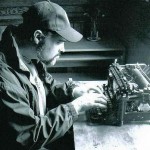 HABIT FOUR: CASTING A WIDE NET
HABIT FOUR: CASTING A WIDE NET
I’ve said many times that writing nonfiction is the secret to making a living as a freelance writer, but the truth is more complex than that. Nonfiction writing is key because there’s such a wide and varied market for the work. Put one way, there are more than ten times as many sections in the Writers’ Market for nonfiction than for fiction, and most of those sections are much larger than those for fiction. It comes down to casting a wider net: being willing to write not just what you want, but whatever you can. My favorite topics for writing are health and fitness, martial arts, travel and fitness. Most of my writing money comes from personal finance, legal writing and business advice columns. There are three ways to cast a wider net with your writing: write about more things, write for more publications, and write more. Writing About More Quick: write a list of 20 things you know well, or would like to learn about. Now, for each of those things, make a list of 100 topics you could write about or research. You now have 1,000 potential articles to sell. Constantly think about how to turn your experiences into articles, books and blog posts. Write For More Publications Even as print burns out, there are thousands of magazines and websites willing to pay you to write for them. Do the research to find out who carries articles about your areas of interest and expertise. When you have an article idea, pitch multiple zines with slightly different angles on the topics. Also be willing to pitch tangential publications. If you’re a travel writer researching a piece on museums in a town, also pitch the hobby magazines related to each museum. Look for kids activities at each location for an article for the local parenting mag. This makes the most of your research, and gives you extra clips for your portfolio. Write More This is one of the biggest differences between professionals and amateurs I’ve noticed. Amateurs on web forums I frequent talk about writing 1,000 words a day on a good day. Today — and it’s not a particularly busy day — I’m at 4,000 with another 2,000 scheduled for after this post. Develop the discipline, work habits and familiarity with your own energy flow that lets you set a high bar for how much you can write. Like any other skill, you’ll get faster and more proficient the more you write. What are some of your insights for casting a wider net? How do you generate article ideas? What’s your process for finding publishers? How have you mastered writing quickly and well? I look forward to your answers in the comments. Read parts one, two and three of this series if you haven’t already. Stay tuned for part four.



